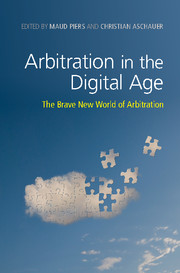Book contents
- Arbitration in the Digital Age
- Arbitration in the Digital Age
- Copyright page
- Contents
- Contributors
- Foreword
- Introduction
- 1 Survey on the Present Use of ICT in International Arbitration
- Part I The Use of Technology in International Arbitration
- Part II Arbitration, Arbitrators, Counsel and the Internet
- 7 E-Arbitration Agreements and E-Awards: Arbitration Agreements Concluded in an Electronic Environment and Digital Arbitral Awards
- 8 Building on OArb Attributes in Pursuit of Justice
- 9 Legislating for an Effective and Legitimate System of Online Consumer Arbitration
- 10 Arbitrators and Their Online Identity
- 11 How Online Sources Affect Counsel Strategies and Behavior in Arbitration
- 12 Conclusion
- Index
9 - Legislating for an Effective and Legitimate System of Online Consumer Arbitration
from Part II - Arbitration, Arbitrators, Counsel and the Internet
Published online by Cambridge University Press: 12 January 2018
- Arbitration in the Digital Age
- Arbitration in the Digital Age
- Copyright page
- Contents
- Contributors
- Foreword
- Introduction
- 1 Survey on the Present Use of ICT in International Arbitration
- Part I The Use of Technology in International Arbitration
- Part II Arbitration, Arbitrators, Counsel and the Internet
- 7 E-Arbitration Agreements and E-Awards: Arbitration Agreements Concluded in an Electronic Environment and Digital Arbitral Awards
- 8 Building on OArb Attributes in Pursuit of Justice
- 9 Legislating for an Effective and Legitimate System of Online Consumer Arbitration
- 10 Arbitrators and Their Online Identity
- 11 How Online Sources Affect Counsel Strategies and Behavior in Arbitration
- 12 Conclusion
- Index
Summary
This chapter addresses the conflict between the restrictive and negative view often taken towards consumer arbitration and the supportive and positive view often taken towards ODR by arguing that a properly designed system of online consumer arbitration can fulfil the promise of consumer arbitration while avoiding its greatest risks. After clarifying what is meant by the term ‘online arbitration’ and addressing the important differences that exist between commercial arbitration and consumer arbitration, this chapter examines the current regulatory framework applicable to consumer arbitration, contrasting the two dominant regulatory approaches found in the European Union and the United States. Moreover, this chapter discusses the distinctive and problematic features of consumer arbitration and addresses the additional problems that can develop when consumer arbitration is undertaken in the ODR context. Lastly, this chapter considers current alternatives to online consumer arbitration and concludes by proposing four guarantees that legislators should include to ensure a fair and effective system of online consumer arbitration.
- Type
- Chapter
- Information
- Arbitration in the Digital AgeThe Brave New World of Arbitration, pp. 209 - 245Publisher: Cambridge University PressPrint publication year: 2018

